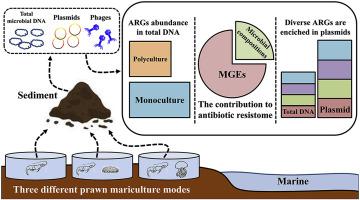Ecotoxicology and Environmental Safety ( IF 6.8 ) Pub Date : 2020-09-15 , DOI: 10.1016/j.ecoenv.2020.111310 Zelong Zhao 1

|
Antibiotic resistance genes (ARGs) in mariculture sediments pose a potential risk to public health due to their ability to transfer from environmental bacteria to human pathogens. Long term, this may reduce pathogen susceptibility to antibiotics in medical settings. In recent years, the poly-culture of multiple species has become a popular mariculture approach in China, thanks to its environmental and economic benefits. However, differences in microbial communities and antibiotic resistome between mono- and poly-culture systems are still unclear. In this study, microbial community composition and profiles of entire (microbial DNA) and mobile (plasmid and phage) ARGs in prawn mono- and poly-culture systems were investigated using metagenomics. The abundance of several viruses and human pathogens were enhanced in prawn poly-culture ponds, when compared to monoculture systems. In contrast, sediments from poly-culture systems had a lower diversity and ARG abundance when compared to mono-culture approaches. These ARG variations were predominantly related to mobile genetic elements. Prawn mariculture activities exerted a unique selectivity for ARGs in plasmids, and this selectivity was not influenced by culture methods. The findings of this study have important implications for the selection of mariculture systems in preventing pollution with ARGs.


























 京公网安备 11010802027423号
京公网安备 11010802027423号